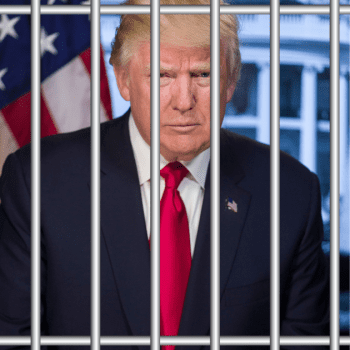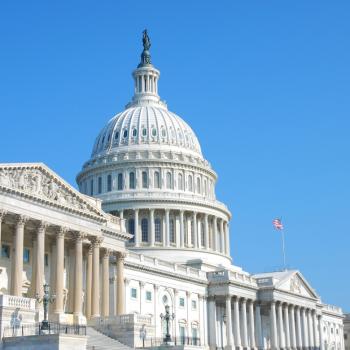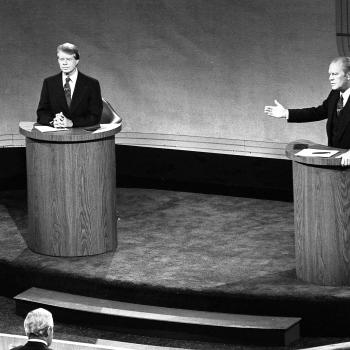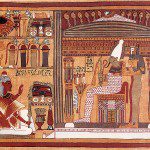“Boycott China’s Winter Olympics?”, asked a Christianity Today headline last week. “Many American Christians Agree.”
Well, kinda. CT was reporting on a Pew survey from January 10-17, on American responses to the U.S. diplomatic boycott of the Winter games currently taking place in Beijing, China. True enough, 62% of white evangelicals who had heard anything about the boycott for once agreed (34% strongly) with something the Biden Administration did. But that’s basically identical to the 63% of all respondents who agreed.
Again, with the proviso that they had heard of the boycott. But 45% of all Americans — of any religion — knew nothing about it.
And the diplomatic boycott is a token gesture anyway; it doesn’t keep American athletes from participating, American corporations from investing in sponsorship and advertising, or an American broadcaster from offering hundreds of hours of coverage.
Perhaps more telling are the historically low viewership numbers for NBC, which could reflect Olympic fatigue (the COVID-delayed 2020 Summer Games just concluded a few months ago), American disinterest in sports mostly dominated by Europeans… or a passive protest of the Chinese government’s genocidal treatment of its own Uighur Muslim population, among the other dismal aspects of Beijing’s human rights record.
Not a few activists and commentators have even suggested a comparison between Beijing 2022 and the most infamous of all Olympics, the 1936 Summer Games in Berlin. “The Nazi propaganda machine paraded the Third Reich on the world stage,” explained Eric Patterson last week in the Christian periodical Providence. While he emphasized the symbolic significance of Jesse Owens prevailing on that very stage, Patterson did note that there was a serious campaign to boycott the Nazi Olympics, one that included “religious figures such as Reinhold Niebuhr.”
So let me use the rest of today’s post to dig deeper into that effort, which brought together an ecumenical array of religious figures. Not just Protestants like Niebuhr, but Jews and Catholics.

Berlin had been awarded the 1936 Summer Games five years earlier, part of an international effort to heal the wounds left by World War I (which had prevented the 1916 games from being held in Berlin). But the fragile democratic republic that accepted the Olympic bid in 1931 soon gave way to a right-wing dictatorship. Adolf Hitler tried to defuse international concerns by enlisting the help of industrialist Avery Brundage, head of the U.S. Olympic Committee. Although Brundage had initially warned Hitler against discriminating against Jewish athletes, he returned from a stage-managed tour of Berlin facilities convinced that any talk of a 1936 boycott could only be a “Jewish-Communist conspiracy.”
Yet such talk grew more serious in the fall of 1935, after the Nazi regime stripped Jews of citizenship in the infamous Nuremberg Laws. “The German government,” reported British ambassador Eric Phipps, “are simply terrified lest Jewish pressure may induce the United States Government to withdraw their team and so wreck the festival, the material and propagandist value of which, they think, can scarcely be exaggerated.” But while the American Jewish Congress and Jewish Labor Committee did coordinate a boycott (not just of the Olympics, but of German goods and services more generally), they had the support of prominent Christians.
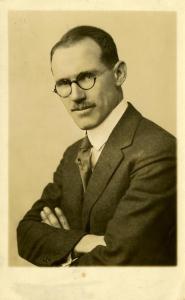
That list included Protestants like Henry Smith Leiper, a Congregational missionary who warned a radio audience in November 1935 that “the average American is complacent about what is happening in Germany, because he hasn’t the faintest idea of what it really is.” Much as he supported post-WWI international reconciliation, Leiper could “not believe that true friendship to Germany’s people is to be expressed by strengthening the prestige or the control of a brutal, unscrupulous type of government which denies to every individual those essential liberties of thought and of moral judgment without which man becomes a mere automaton in a vast process of bureaucratic regimentation.” Those who accept the universal appeal and benefits of sport, he concluded, “cannot logically deny the existence of other universals that are even more fundamental. One of them is elemental human justice.”
Leiper co-founded a committee on Fair Play in Sports whose members included Reinhold Niebuhr, Harry Emerson Fosdick, and Adam Clayton Powell, Jr. They called on fellow Protestant pastors to use their pulpits to speak out against the Berlin games, but it was American Catholics who took the lead in the campaign to keep American athletes from inadvertently “strengthening the prestige” of Hitler’s regime.
After Charles H. Sherrill, an American member of the International Olympic Committee, secured nothing more from Hitler than a promise of token Jewish participation in the Games and then warned that a boycott would itself unleash an anti-Semitic backlash, the Catholic magazine Commonweal editorialized against American participation. “If it is possible to insult the Jew of these United States,” began editor George N. Shuster, “then General Sherrill has insulted him.” But the bulk of Shuster’s complaint had to do with what a Nazi Olympiad would mean for adherents of his own faith:
Being what they are, the Berlin Olympics have an evident and sinister anti-Catholic purpose. It is not merely a question of the persistent violent hostility of Hitlerism to the Church—a hostility which has sent hundreds of of the faithful to death or into exile; which has rendered the life of the clergy a continuous martyrdom; and which has impoverished and ruined hundreds of thousands. No—these games are to set the seal of approval upon the radically anti-Christian Nazi doctrine of youth.
(In his radio talk, Henry Leiper also alluded to Christian concerns about “the pagan basis upon which Hitler youth is supposed to be brought up…”)
So, Shuster concluded, “no Catholic can share in these games, either as a participant or a supporter, without aiding and abetting an effort to destroy the Christian faith.”
Shuster and Leiper had a powerful ally in Jeremiah Titus Mahoney, the Catholic head of the Amateur Athletic Union. The son of an Irish immigrant, Mahoney had already complained to the head of the German Olympic Committee that Germany was guilty not only of “innumerable intrusions into Olympic business,” but “much worse, of monstrous incidents of racism, brutality and genocide.” Mahoney saw “no room for discrimination on grounds of race, color, or creed in the Olympics,” whose code was “the direct antithesis of Nazi ideology.”
(“It is futile and hypocritical,” complained black sprinter Ben Johnson, “that Judge Mahoney should attempt to clean up conditions in Germany before cleaning up similar conditions in America.” While acknowledging “that there is altogether too much discrimination and injustice in our own land,” Henry Smith Leiper placed “discrimination in Nazi Germany… in a different category… The Nazi openly and frankly calls for the utter eradication of a whole race.” Incidentally, Johnson — a rival of Jesse Owens — wound up missing the Olympics with an injury.)
Mahoney backed a boycott, rather than “giving American moral and financial support to the Nazi regime, which is opposed to all that Americans hold dearest.” In the end, he was outmaneuvered by his friend Avery Brundage, who forced a narrow vote in the AAU that ensured American participation in the Berlin Games.
But as Olympic historian John Lucas explained in a 2008 article in the Journal of Sport History, Mahoney continued to speak out against Nazism. He marked Hitler’s fifth year in power with an anti-Nazi address to a full house at Carnegie Hall in January 1938. After WWII began, Mahoney attacked the German-Soviet non-aggression pact that made the invasion of Poland possible as “an illicit and immoral aggressive combination to destroy liberty and democracy and God everywhere.”
For more on the attempted boycott of the 1936 Olympics, see this 2021 article by sports historian Frederic Frommer and this excerpt from journalist Jeremy Schaap’s book about the Berlin Games, released just before the last Olympiad held in Beijing.



